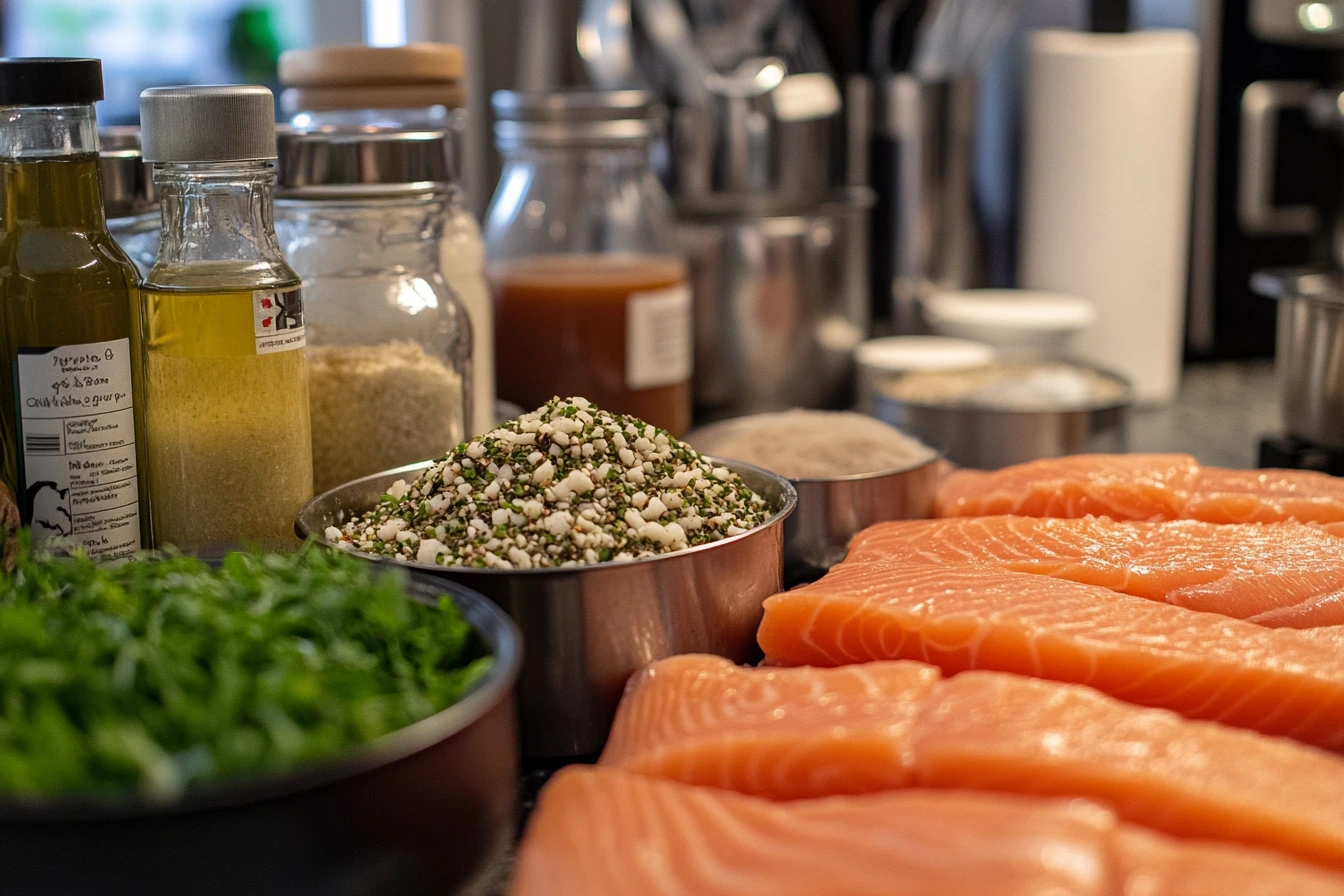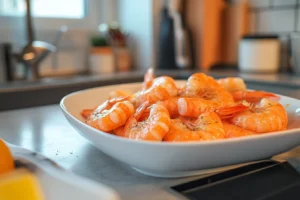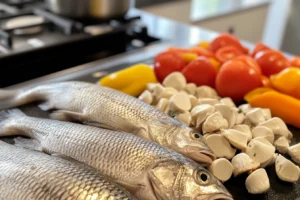Introduction and Basics of Fish Nutrition
Proper fish nutrition plays a vital role in maintaining your fish’s health, growth, and longevity. Selecting the best fish food involves more than just picking what’s on the store shelf. It’s about understanding the dietary needs of your fish and choosing the right ingredients to meet them.
For readers interested in creating their own nutritious fish food at home, check out How to Make Homemade Fish Feed for a step-by-step guide.
Overview of Fish Nutrition
Fish, like all animals, require a balanced diet to thrive. However, a poor diet can quickly lead to several problems, such as:
- Stunted growth
- Weak immune systems
- Poor coloration and energy levels
In order to keep fish healthy, their diet must include a proper balance of proteins, fats, vitamins, minerals, and a small amount of carbohydrates. For example, proteins are vital for growth and repair, while fats provide much-needed energy. At the same time, vitamins and minerals play an essential role in supporting the immune system and promoting overall vitality.
Therefore, choosing the right fish food is crucial for their health. Without proper nutrition, fish may suffer from deficiencies that affect not only their health but also the tank’s environment.
For example:
- Proteins are essential for growth and muscle repair.
- Healthy fats provide energy and support organ function.
- Vitamins and minerals promote immunity and overall health.
Therefore, feeding your fish the right food is critical for their survival.
Why Ingredients Matter in Fish Food
The ingredients in fish food directly affect your fish’s:
- Growth rate
- Digestive health
- Color vibrancy
- Water quality in the tank
High-quality ingredients like fish meal and krill meal offer better digestibility and nutrition compared to low-quality fillers like cornmeal. In addition:
- Artificial additives and preservatives can harm fish health.
- Excess ash content from poor-quality minerals can increase waste in water.
For instance, a diet with fish meal as the primary ingredient is superior because it is a complete protein source and easy to digest.
Key Nutritional Components in Fish Food
Ensuring the right mix of nutrients is the foundation of a healthy fish diet. In fact, each nutrient group plays a specific role in keeping fish active, vibrant, and healthy. For instance, proteins are essential for growth and tissue repair, while fats provide the energy needed for daily activities. Meanwhile, vitamins and minerals support immune function and overall well-being.
Moreover, a balanced diet helps fish maintain their natural coloration and energy levels, which are critical indicators of their health. By combining the right ingredients, fish owners can promote longevity and vitality in their aquatic pets.
Proteins
Proteins are the most important nutrient in fish food.
They are responsible for:
- Growth and tissue repair
- Reproductive health
Key protein sources include:
- Fish meal: The highest-quality protein, rich in amino acids and easily digestible.
- Krill meal: Improves coloration and provides excellent overall nutrition.
- Spirulina: A plant-based protein that is ideal for herbivorous fish and supports immune health.
However, the required protein levels vary depending on the fish species:
- Tropical fish: Require 38-45% protein for optimal growth and energy.
- Goldfish and koi: Thrive on 30-35% protein, especially in maintenance diets.
- Betta fish: Need high-protein diets of around 40-50% to support their carnivorous nature.
Tip: When selecting fish food, always count the number of protein sources on the label. Fewer, high-quality proteins mean better nutrition and easier digestion, which leads to healthier, more active fish. In contrast, foods with numerous low-quality protein sources may lack essential amino acids, resulting in compromised fish health.
Fats and Lipids
Fats are another essential component, providing energy and supporting cellular function. However, fish require low-fat diets unless they are:
- Growing
- Breeding
Healthy fat sources include:
- Omega-3 fatty acids from fish oil
- Krill oil for energy and color enhancement
Avoid diets with excessive fat levels. For instance, while growing fish benefit from slightly higher fat content, too much fat can lead to obesity and poor water quality.
Vitamins and Minerals
Vitamins and minerals are crucial for maintaining a strong immune system and preventing disease. Fish food should include:
- Vitamins A, C, D, and E: Boost immune function and overall vitality.
- Calcium: Promotes bone and scale health.
- Phosphorus: Essential for proper growth and metabolism.
However, excess ash content, which comes from poor-quality minerals, can result in unnecessary waste. Always aim for low-ash fish food.
Carbohydrates
While fish don’t require a lot of carbohydrates, they are often used as binders in fish food. Quality carb sources include:
- Wheat flour
- Corn gluten
However, excessive fillers like whole corn should be avoided since fish cannot digest them.
Probiotics and Supplements
Probiotics and supplements improve fish digestion and overall health. Benefits include:
- Enhanced nutrient absorption
- Better water quality due to reduced waste
Look for ingredients like:
- Brewers yeast (a natural probiotic)
- Added vitamins for longer shelf life
Tip: Diets with prebiotics and probiotics are ideal for fish with sensitive digestive systems.
Best Ingredients for Fish Food by Species
Different fish species have unique nutritional requirements. Therefore, understanding these needs allows you to select the best ingredients tailored to each type of fish. For instance, carnivorous species like betta fish thrive on high-protein diets, while herbivorous fish such as plecostomus require plant-based nutrients like spirulina and algae.
In addition, tropical fish need a balance of proteins, fats, and vitamins to support their active lifestyles, whereas goldfish and koi benefit from lower-protein diets that are easier to digest, especially in cooler water. By recognizing these distinct dietary needs, you can provide the right food for your fish, ensuring they remain healthy, vibrant, and full of energy.
Ultimately, tailoring the diet to your fish species promotes not only their growth but also their longevity and overall well-being.
Tropical Fish
Tropical fish thrive on protein-rich and balanced diets. The best ingredients for tropical fish include:
- Fish meal: A high-quality protein source essential for growth.
- Spirulina: Enhances coloration and supports immune health.
- Krill meal: Provides omega fatty acids and brightens fish pigmentation.
Recommended Diet Types:
- Pellets: Highly digestible and nutrient-dense.
- Frozen foods: Brine shrimp, bloodworms, and daphnia for variety.
Protein Range: 38-45% for optimal growth and energy.
Goldfish and Koi
Goldfish and koi have slower metabolisms, especially in cold water. Their diets should focus on low-protein, high-fiber ingredients.
Key ingredients include:
- White fish meal: A high-quality, low-fat protein.
- Wheat germ: Easily digestible and excellent for cold-weather feeding.
- Algae-based ingredients: Provide fiber and essential nutrients.
Recommended Diet Types:
- Sinking pellets: Prevent goldfish from gulping air at the surface.
- Maintenance or growth formulas: Adjust based on season and water temperature.
Protein Range: 30-35% for maintenance, slightly higher for juveniles or growing koi.
Betta Fish
Betta fish require high-protein diets to match their carnivorous nature.
Top ingredients include:
- Krill meal: Supports muscle development and enhances color.
- Fish meal: Essential for growth and tissue repair.
- Brine shrimp: Provides variety and essential amino acids.
Feeding Tips:
- Small, frequent meals throughout the day improve digestion.
- Avoid fillers like cornmeal or wheat flour as they are not digestible for bettas.
Protein Range: 40-50% to meet their high energy needs.
Marine Fish
Marine fish require a nutrient-dense diet with added minerals and high-quality proteins. Because marine species live in more challenging environments, their diets must be rich in essential nutrients to support their immune systems and overall health. For example, ingredients like whole krill and squid provide the necessary proteins and omega-3 fatty acids for energy and tissue repair.
In addition, marine fish benefit from plant-based supplements like spirulina, which enhances coloration and boosts immunity. To ensure proper nutrition, a combination of pellets, frozen foods, and occasional live feeds works best for these species.
By providing a well-rounded, nutrient-dense diet, marine fish can thrive, displaying vibrant colors, strong immunity, and optimal energy levels.
Best ingredients include:
- Whole krill and squid: Provide essential fatty acids and amino acids.
- Spirulina: Supports coloration and overall health.
- Marine-based oils: For healthy fats and energy.
Diet Types:
- Pellets: Staple diet for balanced nutrition.
- Frozen or live foods: Enhance variety and simulate natural feeding behavior.
Protein Range: 36-45%, depending on the species and activity levels.
Bottom-Dwellers (Plecostomus, Catfish)
Bottom-dwelling fish need sinking foods rich in plant-based ingredients and proteins.
Key ingredients:
- Algae meal: A primary food source for herbivorous fish.
- Wheat germ: Supports digestion.
- Vegetable supplements: Such as zucchini, spinach, or seaweed.
Diet Types:
- Algae wafers: Sink to the bottom for easy access.
- Sinking pellets: Prevent competition with other fish.
Protein Range: 30-35%, depending on the species.
Shrimp and Invertebrates
Ornamental shrimp are primarily detritivores and benefit from protein and plant-based ingredients.
Top ingredients include:
- Krill meal: Provides essential proteins.
- Fish meal: Supports growth and reproduction.
- Spirulina: Boosts immune health.
Diet Types:
- Small sinking pellets.
- Plant-based supplements like algae or boiled vegetables.
Protein Range: 35-40%, ideal for growth and activity.
Ingredients to Avoid in Fish Food
Choosing the right fish food also means knowing which ingredients to avoid. Low-quality ingredients can harm fish health, decrease water quality, and cause digestive problems.
Low-Quality Fillers
Fillers are often added to fish food to increase bulk and reduce cost. However, these ingredients offer little nutritional value.
Common fillers to avoid:
- Cornmeal: Poorly digestible for fish.
- Wheat flour in excess: Provides minimal protein and energy.
Tip: Always check the label for the first few ingredients. High-quality food starts with fish meal or krill meal.
Artificial Additives
Artificial additives, including colors and preservatives, can harm fish health over time. These chemicals provide no nutritional value and may cause digestive stress.
Ingredients to watch out for:
- Artificial dyes: Look for natural color enhancers like spirulina instead.
- Synthetic preservatives: Opt for foods with natural preservatives like inositol.
Byproducts and Incomplete Protein Sources
Some fish food brands use protein byproducts or cheap alternatives to save costs. These ingredients may lack essential amino acids.
Avoid:
- Meat byproducts: Often low-quality and difficult to digest.
- Incomplete protein supplements: Indicated by terms like DL-methionine.
For example, fish food with excessive protein sources listed (e.g., corn gluten, soy protein) may compromise fish health.
High Ash Content
Ash refers to the mineral content in fish food. While some minerals are essential, excessive ash can indicate low-quality ingredients.
Impact of high ash content:
- Poor digestion
- Increased waste production
- Cloudy water
Tip: Choose foods with ash content below 10% for optimal quality.
FAQs (People Also Ask)
In this section, we answer the most common questions that fish owners have about choosing the best ingredients for fish food and maintaining a healthy diet for their aquatic pets.
What are the most important nutrients for fish?
The most important nutrients for fish include:
- Proteins: Essential for growth and tissue repair. High-quality sources include fish meal and krill meal.
- Healthy fats: Provide energy and promote cell function. Look for Omega-3 fatty acids from fish oils.
- Vitamins and minerals: Boost immunity and prevent deficiencies. Key examples include Vitamin C and calcium.
For optimal nutrition, always check the guaranteed analysis label for protein, fat, and ash content.
Is fish meal the best ingredient for fish food?
Yes, fish meal is considered the best protein source for fish. It is highly digestible, rich in essential amino acids, and provides:
- Improved growth rates
- Stronger immune systems
- Better energy conversion
However, ensure fish meal is the primary ingredient listed on the packaging. Avoid foods where it is replaced with incomplete protein sources like soy protein or corn gluten.
How can I tell if fish food is low quality?
Signs of low-quality fish food include:
- Excessive fillers: Ingredients like cornmeal and wheat flour dominate the list.
- Artificial additives: Synthetic dyes or preservatives.
- High ash content: Indicates poor-quality mineral sources.
To determine quality, check that:
- Fish meal or krill meal appears as the first ingredient.
- Protein content is appropriate for your fish species (e.g., 40-50% for bettas).
How much protein should fish food contain?
Protein requirements depend on fish species and their activity levels:
- Tropical fish: 38-45% protein
- Goldfish and koi: 30-35% protein
- Betta fish: 40-50% protein
For juvenile or growing fish, aim for higher protein levels to support development. Adult fish and low-activity species require less protein.
Is homemade fish food better than commercial fish food?
Homemade fish food can provide fresh and natural ingredients; however, it may lack the balanced nutrition of commercial options.
Pros of homemade food:
- Control over ingredients
- No artificial additives
Cons:
- Difficult to balance protein, fat, and vitamins
- Short shelf life
Tip: Use homemade food as a supplement to high-quality commercial diets.
Tips for Choosing the Best Fish Food
Choosing the best fish food can seem overwhelming, but focusing on a few key factors can simplify the process. By reading labels, understanding ingredients, and tailoring the diet to your fish species, you can ensure optimal health and vitality for your aquatic pets.
Reading Labels Effectively
When selecting fish food, always examine the ingredients list and nutritional information:
- Look for fish meal or krill meal as the first ingredient.
- Check the guaranteed analysis:
- Protein: 30-50% depending on the species.
- Fat: 4-10% for energy.
- Ash: Below 10% for mineral balance.
- Avoid foods with excessive fillers, like cornmeal or soy flour.
For example, a label that begins with fish meal, followed by spirulina and krill meal, indicates a nutrient-rich diet.
Choosing the Right Food Type
Fish food comes in various forms, and the right choice depends on the species and feeding habits:
- Pellets:
- Ideal for most species due to their high nutrient density.
- Available in floating, sinking, and slow-release varieties.
- Flakes:
- Suitable for surface feeders but lose nutrients quickly in water.
- Best for small tropical fish.
- Frozen and live foods:
- Great for variety and stimulating natural feeding behavior.
- Examples include brine shrimp, bloodworms, and daphnia.
- Algae wafers:
- Best for bottom-dwelling fish like plecostomus.
Feeding Schedule Based on Species
A proper feeding schedule ensures your fish get adequate nutrition without overfeeding.
- Tropical fish: Feed 2-3 times a day in small portions.
- Goldfish and koi: Adjust feeding frequency based on water temperature:
- Warm water: 2-4 small meals daily
- Cold water: Feed less often, as digestion slows.
- Betta fish: Feed 2-3 small meals daily with high-protein pellets.
- Bottom-dwellers: Feed sinking pellets or algae wafers at night when they are most active.
Tip: Avoid overfeeding to prevent waste buildup and poor water quality. Feed small amounts that your fish can consume within 2-5 minutes.
Variety for Balanced Nutrition
Even the best commercial fish food can benefit from occasional supplements to provide variety. Examples include:
- Frozen foods: Bloodworms, brine shrimp, and mysis shrimp.
- Fresh vegetables: Zucchini slices, spinach, and peas (for herbivores).
- Live foods: Encourages natural hunting behavior in carnivorous fish.
Providing a mix of food types prevents boredom, ensures complete nutrition, and keeps your fish active.
Conclusion
Feeding your fish the right diet is one of the most important aspects of ensuring their health, growth, and longevity. By understanding the best ingredients for fish food, you can make informed decisions that directly impact your fish’s well-being and the quality of their environment.
Key Takeaways
- Prioritize high-quality ingredients like fish meal, krill meal, and spirulina, which are rich in essential nutrients.
- Avoid low-quality fillers such as cornmeal and excessive wheat flour, which offer little nutritional value.
- Tailor the diet to your fish species:
- Tropical fish: High-protein pellets and occasional frozen foods.
- Goldfish and koi: Low-protein, fiber-rich diets, especially in colder water.
- Betta fish: Protein-dense foods like krill and brine shrimp.
- Read food labels carefully to ensure proper nutrient balance. Look for diets with low ash content and no artificial additives.
Why Variety and Quality Matter
Providing a variety of foods—such as pellets, frozen foods, and fresh vegetables—ensures that your fish receive all the necessary nutrients for a balanced diet. It also prevents nutritional deficiencies, promotes natural feeding behaviors, and keeps your fish active and vibrant.
In addition, quality fish food reduces waste, improves water clarity, and supports a healthier aquarium ecosystem.
If you prefer homemade solutions, explore these Best Homemade Food for Fish for additional protein-rich recipes tailored to your fish species.



